- Home
- Fyodor Dostoyevsky
Poor Folk Anthology Page 22
Poor Folk Anthology Read online
Page 22
“Do you know, Yakov Petrovitch, what I advise you to do?” Anton Antonovitch went on. “Go and consult a doctor. Do you know, you look somehow quite unwell. You eyes look peculiar . you know, there’s a peculiar expression in them.”
“No, Anton Antonovitch, I feel, of course . that is, I keep wanting to ask about this clerk.”
“Well?”
“That is, have not you noticed, Anton Antonovitch, something peculiar about him, something very marked?”
“That is . ”
“That is, I mean, Anton Antonovitch, a striking likeness with somebody, for instance; with me, for instance? You spoke just now, you see, Anton Antonovitch, of a family likeness. You let slip the remark. You know there really are sometimes twins exactly alike, like two drops of water, so that they can’t be told apart. Well, it’s that that I mean.”
“To be sure,” said Anton Antonovitch, after a moment’s thought, speaking as though he were struck by the fact for the first time: “yes, indeed! You are right, there is a striking likeness, and you are quite right in what you say. You really might be mistaken for one another,” he went on, opening his eyes wider and wider; “and, do you know, Yakov Petrovitch, it’s positively a marvellous likeness, fantastic, in fact, as the saying is; that is, just as you . Have you observed, Yakov Petrovitch? I wanted to ask you to explain it; yes, I must confess I didn’t take particular notice at first. It’s wonderful, it’s really wonderful! And, you know, you are not a native of these parts, are you, Yakov Petrovitch?”
“No.”
“He is not from these parts, you know, either. Perhaps he comes from the same part of the country as you do. Where, may I make bold to inquire, did your mother live for the most part?”
“You said . you say, Anton Antonovitch, that he is not a native of these parts?”
“No, he is not. And indeed how strange it is!” continued the talkative Anton Antonovitch, for whom it was a genuine treat to gossip. “It may well arouse curiosity; and yet, you know, you might pass him by, brush against him, without noticing anything. But you mustn’t be upset about it. It’s a thing that does happen. Do you know, the same thing, I must tell you, happened to my aunt on my mother’s side; she saw her own double before her death … ”
“No, I— excuse me for interrupting you, Anton Antonovitch — I wanted to find out, Anton Antonovitch, how that clerk . that is, on what footing is he here?”
“In the place of Semyon Ivanovitch, to fill the vacancy left by his death; the post was vacant, so he was appointed. Do you know, I’m told poor Semyon Ivanovitch left three children, all tiny dots. The widow fell at the feet of his Excellency. They do say she’s hiding something; she’s got a bit of money, but she’s hiding it.”
“No, Anton Antonovitch, I was still referring to that circumstance.”
“You mean … ? To be sure! But why are you so interested in that? I tell you not to upset yourself. All this is temporary to some extent. Why, after all, you know, you have nothing to do with it. So it has been ordained by God Almighty, it’s His will, and it is sinful repining. His wisdom is apparent in it. And as far as I can make out, Yakov Petrovitch, you are not to blame in any way. There are all sorts of strange things in the world! Mother Nature is liberal with her gifts, and you are not called upon to answer for it, you won’t be responsible. Here, for instance, you have heard, I expect, of those — what’s their name? — oh, the Siamese twins who are joined together at the back, live and eat and sleep together. I’m told they get a lot of money.”
“Allow me, Anton Antonovitch … ”
“I understand, I understand! Yes! But what of it? It’s no matter, I tell you, ad far as I can see there’s nothing for you to upset yourself about. After all, he’s a clerk — as a clerk he seems to be a capable man. He says his name is Golyadkin, that he’s not a native of this district, and that he’s a titular councillor. He had a personal interview with his Excellency.”
“And how did his Excellency … ?”
“It was all right; I am told he gave a satisfactory account of himself, gave his reasons, said, ‘It’s like this, your Excellency,’ and that he was without means and anxious to enter the service, and would be particularly flattered to be serving under his Excellency . all that was proper, you know; he expressed himself neatly. He must be a sensible man. But of course he came with a recommendation; he couldn’t have got in without that … ”
“Oh, from whom . that is, I mean, who is it has had a hand in this shameful business?”
“Yes, a good recommendation, I’m told; his Excellency, I’m told laughed with Andrey Filippovitch.”
“Laughed with Andrey Filippovitch?”
“Yes, he only just smiled and said that it was all right, and that he had nothing against it, so long as he did his duty … ”
“Well, and what more? You relieve me to some extent, Anton Antonovitch; go on, I entreat you.”
“Excuse me, I must tell you again . Well, then, come, it’s nothing, it’s a very simple matter; you mustn’t upset yourself, I tell you, and there’s nothing suspicious about it . ”
“No. I . that is, Anton Antonovitch, I want to ask you, didn’t his Excellency say anything more … about me, for instance?”
“Well! To be sure! No, nothing of the sort; you can set your mind quite at rest. You know it is, of course, a rather striking circumstance, and at first … why, here, I, for instance, I scarcely noticed it. I really don’t know why I didn’t notice it till you mentioned it. But you can set your mind at rest entirely. He said nothing particular, absolutely nothing,” added good-natured Anton Antonovitch, getting up from his chair.
“So then, Anton, Antonovitch, I … ”
“Oh, you must excuse me. Here I’ve been gossiping about these trivial matters, and I’ve business that is important and urgent. I must inquire about it.”
“Anton Antonovitch!” Andrey Filippovitch’s voice sounded, summoning him politely, “his Excellency has been asking for you.”
“This minute, I’m coming this minute, Andrey Filippovitch.” And Anton Antonovitch, taking a pile of papers, flew off first to Andrey Filippovitch and then into his Excellency’s room.
“Then what is the meaning of it?” thought Mr. Golyadkin. “Is there some sort of game going on? So the wind’s in that quarter now . That’s just as well; so things have taken a much pleasanter turn,” our hero said to himself, rubbing his hands, and so delighted that he scarcely knew where he was. “So our position is an ordinary thing. So it turns out to be all nonsense, it comes to nothing at all. No one has done anything really, and they are not budging, the rascals, they are sitting busy over their work; that’s splendid, splendid! I like the good-natured fellow, I’ve always liked him, and I’m always ready to respect him . though it must be said one doesn’t know what to think; this Anton Antonovitch . I’m afraid to trust him; his hair’s grey, and he’s getting shaky. It’s an immense and glorious thing that his Excellency said nothing, and let it pass! It’s a good thing! I approve! Only why does Andrey Filippovitch interfere with his grins? What’s he got to do with it? The old rogue. Always on my track, always, like a black cat, on the watch to run across a man’s path, always thwarting and annoying a man, always annoying and thwarting a man … ”
Mr. Golyadkin looked around him again, and again his hopes revived. Yet he felt that he was troubled by one remote idea, an unpleasant idea. It even occurred to him that he might try somehow to make up to the clerks, to be the first in the field even (perhaps when leaving the office or going up to them as though about his work), to drop a hint in the course of conversation, saying, “This is how it is, what a striking likeness, gentlemen, a strange circumstance, a burlesque farce!” — that is, treat it all lightly, and in this way sound the depth of the danger. “Devils breed in still waters,” our hero concluded inwardly.
Mr. Golyadkin, however, only contemplated this; he thought better of it in time. He realized that this would be going too far. “That’s your temperament,” he sa
id to himself, tapping himself lightly on the forehead; “as soon as you gain anything you are delighted! You’re a simple soul! No, you and I had better be patient, Yakov Petrovitch; let us wait and be patient!”
Nevertheless, as we have mentioned already, Mr. Golyadkin was buoyed up with the most confident hopes, feeling as though he had risen from the dead.
“No matter,” he thought, “it’s as though a hundred tons had been lifted off my chest! Here is a circumstance, to be sure! The box has been opened by the lid. Krylov is right, a clever chap, a rogue, that Krylov, and a great fable-write! And as for him, let him work in the office, and good luck to him so long as he doesn’t meddle or interfere with any one; let him work in the office — I consent and approve!”
Meanwhile the hours were passing, flying by, and before he noticed the time it struck four. The office was closed. Andrey Filippovitch took his hat, and all followed his example in due course. Mr. Golyadkin dawdled a little on purpose, long enough to be the last to go out when all the others had gone their several ways. Going out from the street he felt as though he were in Paradise, so that he even felt inclined to go a longer way round, and to walk along the Nevsky Prospect.
“To be sure this is destiny,” thought our hero, “this unexpected turn in affairs. And the weather’s more cheerful, and the frost and the little sledges. And the frost suits the Russian, the Russian gets on capitally with the frost. I like the Russian. And the dear little snow, and the first few flakes in autumn; the sportsman would say, ‘It would be nice to go shooting hares in the first snow.’ Well, there, it doesn’t matter.”
This was how Mr. Golyadkin’s enthusiasm found expression. Yet something was fretting in his brain, not exactly melancholy, but at times he had such a gnawing at his heart that he did not know how to find relief.
“Let us wait for the day, though, and then we shall rejoice. And, after all, you know, what does it matter? Come, let us think it over, let us look at it. Come, let us consider it, my young friend, let us consider it. Why, a man’s exactly like you in the first place, absolutely the same. Well, what is there in that? If there is such a man, why should I weep over it? What is it to me? I stand aside, I whistle to myself, and that’s all! That’s what I laid myself open to, and that’s all about it! Let him work in the office! Well, it’s strange and marvellous, they say, that the Siamese twins . But why bring in Siamese twins? They are twins, of course, but even great men, you know, sometimes look queer creatures. In fact, we know from history that the famous Suvorov used to crow like a cock . But there, he did all that with political motives; and he was a great general … but what are generals, after all? But I keep myself to myself, that’s all, and I don’t care about any one else, and, secure in my innocence, I scorn my enemies. I am not one to intrigue, and I’m proud of it. Gentle, straightforward, neat and nice, meek and mild.”
All at once Mr. Golyadkin broke off, his tongue failed him and he began trembling like a leaf; he even closed his eyes for a minute. Hoping, however, that the object of his terror was only an illusion, he opened his eyes at last and stole a timid glance to the right. No, it was not an illusion! His acquaintance of that morning was tripping along by his side, smiling, peeping into his face, and apparently seeking an opportunity to begin a conversation with him. The conversation was not begun, however. They both walked like this for about fifty paces. All Mr. Golyadkin’s efforts were concentrated on muffling himself up, hiding himself in his coat and pulling his hat down as far as possible over his eyes. To complete his mortification, his companion’s coat and hat looked as though they had been taken off Mr. Golyadkin himself.
“Sir,” our hero articulated at last, trying to speak almost in a whisper, and not looking at his companion, “we are going different ways, I believe . I am convinced of it, in fact,” he said, after a pause. “I am convinced, indeed, that you quite understand me,” he added, rather severely, in conclusion.
“I could have wished … ” his companion pronounced at last, “I could have wished . no doubt you will be magnanimous and pardon me . I don’t know to whom to address myself here . my circumstances . I trust you will pardon my intrusiveness. I fancied, indeed, that, moved by compassion, you showed some interest in me this morning. On my side, I felt drawn to you from the first moment. I … ”
At this point Mr. Golyadkin inwardly wished that his companion might sink into the earth.
“If I might venture to hope that you would accord me an indulgent hearing, Yakov Petrovitch … ”
“We — here, we — we . you had better come home with me,” answered Mr. Golyadkin. “We will cross now to the other side of the Nevsky Prospect, it will be more convenient for us there, and then by the little back street . we’d better go by the back street.”
“Very well, by all means let us go by the back street,” our hero’s meek companion responded timidly, suggesting by the tone of his reply that it was not for him to choose, and that in his position he was quite prepared to accept the back street. As for Mr. Golyadkin, he was utterly unable to grasp what was happening to him. He could not believe in himself. He could not get over his amazement.
Chapter 7
He recovered himself a little on the staircase as he went up to his flat.
“Oh, I’m a sheep’s head,” he railed at himself inwardly. “Where am I taking him? I am thrusting my head into the noose. What will Petrushka think, seeing us together? What will the scoundrel dare to imagine now? He’s suspicious … ”
But it was too late to regret it. Mr. Golyadkin knocked at the door; it was opened, and Petrushka began taking off the visitor’s coat as well as his master’s. Mr. Golyadkin looked askance, just stealing a glance at Petrushka, trying to read his countenance and divine what he was thinking. But to his intense astonishment he saw that his servant showed no trace of surprise, but seemed, on the contrary, to be expecting something of the sort. Of course he did not look morose, as it was; he kept his eyes turned away and looked as though he would like to fall upon somebody.
“Hasn’t somebody bewitched them all today?” thought our hero. “Some devil must have got round them. There certainly must be something peculiar in the whole lot of them today. Damn it all, what a worry it is!”
Such were Mr. Golyadkin’s thoughts and reflections as he led his visitor into his room and politely asked him to sit down. The visitor appeared to be greatly embarrassed, he was very shy, and humbly watched every movement his host made, caught his glance, and seemed trying to divine his thoughts from them. There was a downtrodden, crushed, scared look about all his gestures, so that — if the comparison may be allowed — he was at that moment rather like the man who, having lost his clothes, is dressed up in somebody else’s: the sleeves work up to the elbows, the waist is almost up to his neck, and he keeps every minute pulling down the short waistcoat; he wriggles sideways and turns away, tries to hide himself, or peeps into every face, and listens whether people are talking of his position, laughing at him or putting him to shame — and he is crimson with shame and overwhelmed with confusion and wounded vanity. Mr. Golyadkin put down his hat in the window, and carelessly sent it flying to the floor. The visitor darted at once to pick it up, brushed off the dust, and carefully put it back, while he laid his own on the floor near a chair, on the edge of which he meekly seated himself. This little circumstance did something to open Mr. Golyadkin’s eyes; he realized that the man was in great straits, and so did not put himself out for his visitor as he had done at first, very properly leaving all that to the man himself. The visitor, for his part, did nothing either; whether he was shy, a little ashamed, or from politeness was waiting for his host to begin is not certain and would be difficult to determine. At that moment Petrushka came in; he stood still in the doorway, and fixed his eyes in the direction furthest from where the visitor and his master were seated.
“Shall I bring in dinner for two?” he said carelessly, in a husky voice.
“I— I don’t know . you . yes, bring dinner for two, my boy.”
Petrushka went out. Mr. Golyadkin glanced at his visitor. The latter crimsoned to his ears. Mr. Golyadkin was a kind-hearted man, and so in the kindness of his heart he at once elaborated a theory.
“The fellow’s hard up,” he thought. “Yes, and in his situation only one day. Most likely he’s suffered in his time. Maybe his good clothes are all that he has, and nothing to get him a dinner. Ah, poor fellow, how crushed he seems! But no matter; in a way it’s better so. Excuse me,” began Mr. Golyadkin, “allow me to ask what I may call you.”
“I . I . I’m Yakov Petrovitch,” his visitor almost whispered, as though conscience-stricken and ashamed, as though apologizing for being called Yakov Petrovitch too.
“Yakov Petrovitch!” repeated our visitor, unable to conceal his confusion.
“Yes, just so. The same name as yours,” responded the meek visitor, venturing to smile and speak a little jocosely. But at once he drew back, assuming a very serious air, though a little disconcerted, noticing that his host was in no joking mood.
“You . allow me to ask you, to what am I indebted for the honour … ?”
“Knowing your generosity and your benevolence,” interposed the visitor in a rapid but timid voice, half rising from his seat, “I have ventured to appeal to you and to beg for your . acquaintance and protection … ” he concluded, choosing his phrases with difficulty and trying to select words not too flattering or servile, that he might not compromise his dignity and not so bold as to suggest an unseemly equality. In fact, one may say the visitor behaved like a gentlemanly beggar with a darned waistcoat, with an honourable passport in his pocket, who has not yet learnt by practice to hold out his hand properly for alms.
“You perplex me,” answered Mr. Golyadkin, gazing round at himself, his walls and his visitor. “In what could I . that is, I mean, in what way could I be of service to you?”

 The Eternal Husband
The Eternal Husband Crime and Punishment
Crime and Punishment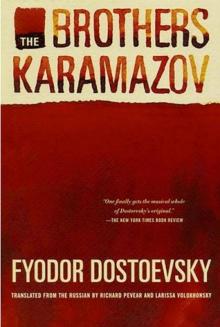 The Brothers Karamazov
The Brothers Karamazov Notes From Underground
Notes From Underground The Idiot
The Idiot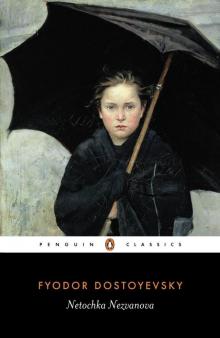 Netochka Nezvanova (Penguin ed.)
Netochka Nezvanova (Penguin ed.)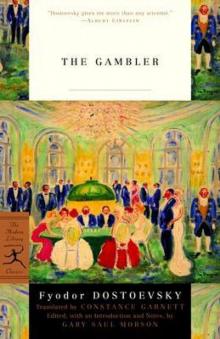 The Gambler
The Gambler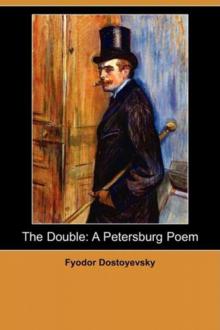 The Double
The Double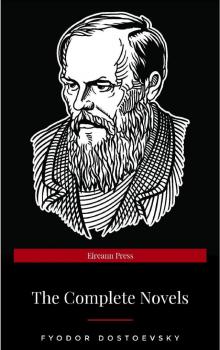 Poor Folk Anthology
Poor Folk Anthology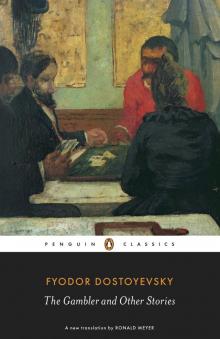 The Gambler and Other Stories (Penguin ed.)
The Gambler and Other Stories (Penguin ed.) Prestuplenie i nakazanie. English
Prestuplenie i nakazanie. English Notes from the Underground
Notes from the Underground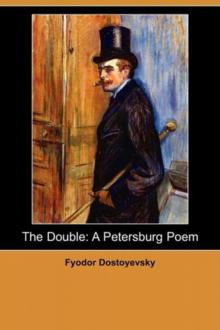 The Double: A Petersburg Poem
The Double: A Petersburg Poem White Nights and Other Stories / The Novels of Fyodor Dostoevsky, Volume X
White Nights and Other Stories / The Novels of Fyodor Dostoevsky, Volume X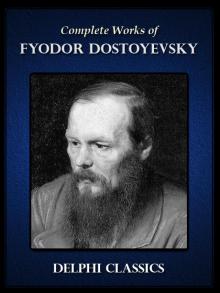 Complete Works of Fyodor Dostoyevsky
Complete Works of Fyodor Dostoyevsky Poor Folk and Other Stories
Poor Folk and Other Stories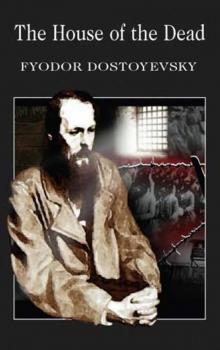 The House of the Dead
The House of the Dead